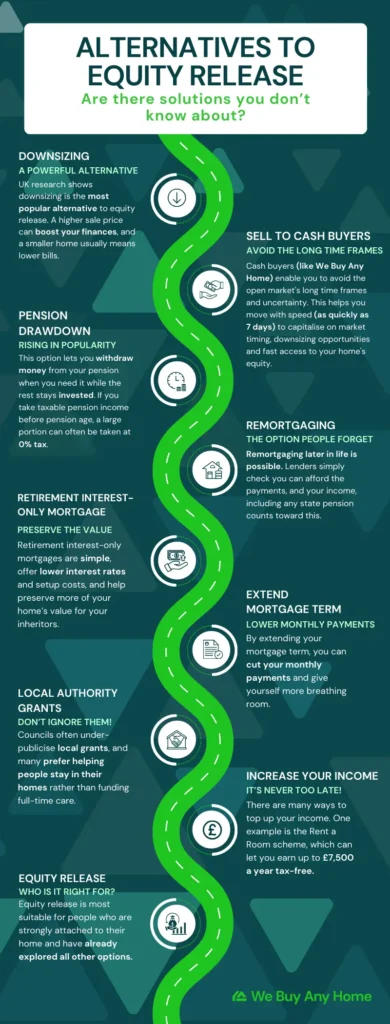Equity release is growing in popularity across the UK, and Europe as a whole.
It’s a great choice for some homeowners.
However, it isn’t the only choice.
There are several alternatives to equity release worth considering.
Below, we’ve broken down each one and its advantages and disadvantages.
Equity release
If you’re over 55 years old, and your net worth is tied up in your property, equity release allows you to unlock some of that money. It comes in two main forms:
- A lifetime mortgage (the most common type) lets you borrow against your home without monthly repayments.
- A home reversion involves you selling a stake in your home for a lump sum of cash. You continue to live there, and the reversion company receives part of the proceeds when the home is sold.
Equity release: a final resort, not the first port of call!
Before we get into the various options, there’s one common misconception that we need to iron out…
Equity release should always be the final resort for your financial future.
There are many other options to consider first.
Many are cheaper, simpler, or far better for preserving your financial independence (and your loved ones’ inheritance).
5 alternatives to equity release

1. Downsizing
Many people believe downsizing is the most sensible and powerful alternative to equity release.
Research on equity release across the UK found that it was the most popular option for accessing wealth by far.
(Equity release came second, everything else trailed far behind.)
From a financial perspective, it’s simple and effective because you’ll reduce your:
- Mortgage payments (often completely)
- Running costs (heating, electricity, water, repairs, etc.)
- Council tax (possibly).
And more.
Once you remove the emotional aspect, and focus on your money, you’ll often be relieved you made this decision.
Sometimes it involves moving to a similar – but smaller – property in the same area. Other times, it involves moving to a different type of property or area.
(Of course, upsizing can also be an option if you are willing to move to an area with cheaper property prices.)
Home is where the heart is
Financial advisers often mention clients who cling to their homes because ‘it’s where the memories are’.
The emotional pull is powerful – but unless you get the timing spot-on, it can also trap people.
It’s a careful balancing act.
That’s why some families get creative. In some cases, both the elderly parent and their children sell up, pool their money, and buy a single home with an annex.
Others have the adult child move into the parent’s home to act as an informal live-in carer, reducing the need for expensive outside help.
When you think outside the box, this all becomes possible. Just be honest with yourself about which is more important: finances, or memories.
Example case: Care and considering what matters
One recent episode of The Meaningful Money Personal Finance Podcast shared the story of a woman with severe health problems. She needed round-the-clock care costing tens of thousands each year.
Everyone advised her to downsize, but she refused because the house was the only thing in life that brought her joy.
In the end, equity release became her only option.
Alternative selling
Sometimes the opportunity to move to the right next property is prevented by time frames or other factors outside of your control in the selling process (i.e., property chains, buyers pulling out, etc.)
In these cases, there are generally two main ways to sell your home fast:
- Selling at property auctions: Property auctions can bring the selling time down to around 8 -12 weeks on average. However, the completion of a sale and the final selling price (which will likely be lower than on the open market) are uncertain until the day of the auction.
- Selling to cash buyers: The best cash buyers (like We Buy Any Home) can purchase properties with in as little as 1 week. They pay around 20% less than the open market value, but they provide speed and certainty.
2. Pension drawdown
Pension drawdown is rising in popularity across the UK – and it’s easy to see why.
With this option, you can take money out of your pension as and when you need it. The rest remains invested (still growing over time, if you choose your investments wisely).
You keep 25% tax-free, and the rest becomes taxable income. So, you won’t be surprised to hear that (just like downsizing) timing is everything.
You’ll undoubtedly come across financial advisers who tell you to draw down before you hit pension age.
Why? Because once your state pension kicks in (currently £11,500 a year under the triple lock), most of your personal tax allowance is used up.
If you withdraw taxable pension income before this, much of it can be taken at 0% tax.
Administrative managing challenges
Just remember that pension drawdown is not for the faint-hearted.
Discipline is crucial to making it work. Otherwise, you’ll overspend, and your pot will drain faster than you realised.
If you the pressure of managing this yourself makes you want to run a million miles away, then annuities (the old-fashioned guaranteed income option) still exist.
Tax on pension draw downs
If you pass away before 75, your undrawn pension can be passed on tax-free. After 75, it’s taxed as income by whoever inherits it.
Either way, pensions are far more generous for inheritance planning than equity release, where interest often eats away large portions of your estate.
3. Remortgaging
Remortgaging, or extending your mortgage term, are the two ‘hidden’ options that most people forget.
Luckily, not you – because you’re reading this article!
It’s a common myth that remortgaging in later life is impossible. This isn’t true – it just comes with some conditions.
Firstly, your income needs to be high enough, with your state pension being factored into these calculations (if necessary).
Retirement interest-only mortgages
Retirement interest-only (RIO) mortgages have changed the landscape dramatically.
They’re nice and simple: you borrow against your home, pay only the interest each month, and the capital is repaid when you die or enter long-term care.
It’s essentially a halfway house between a traditional mortgage and equity release.
Compared to equity release, RIOs:
- Have much lower interest rates
- Have lower setup costs
- Preserve far more of your home’s value for the inheritors.
The catch?
You need to prove that you can afford the monthly interest payments.
But you can even extend your mortgage term, which cuts your monthly payment and thus gives more breathing room.
4. Local Authority Grants
If you’ve been thoroughly unimpressed by all the options laid out in this article, then don’t worry: we’ve got a lifeline coming next!
You should always investigate Local authority grants before jumping into equity release.
Firstly, councils massively under-publicise their local authority grants.
There are many schemes out there that residents don’t know about (Martin Lewis has made a career out of bringing these to our attention!).
Example case: Island healthcare benefits
One story from the Isles of Scilly sums it up perfectly.
Elderly homeowners living on the islands constantly made expensive medical trips back to the mainland for treatment.
They were asset-rich and cash-poor and fully expected to need equity release.
But a savvy financial adviser contacted the local authority, which confirmed the couple were eligible for ill-health benefits they didn’t even know existed.
This meant equity release was avoided entirely.
Know your grants
The same applies across the UK.
In many cases, councils actively prefer to help people stay in their homes rather than fund full-time residential care.
It’s (sadly) very common for people to take out equity release without knowing that alternative methods are out there.
So, don’t be one of those who get caught out – call your council, do your research, and maybe there’s a magic solution waiting for you.
Struggling to navigate around your home? Call the council!
Many people consider equity release because they need to adapt their home for ageing.
Don’t rush off to an equity release expert too quickly, though – because there’s local council options that might be your ‘get out of jail free’ card.
Councils frequently offer disabled facilities grants for:
- En suites
- Wet rooms
- Stairlifts
- Mobility improvements.
There’s also deferred payment agreements, for these.
And almost every council carries out means-tested care support. And they’ll also offer home improvement loans at subsidised rates.
The YouTube channel MoneyManTV highlighted that councils frequently fund mobility adaptations because it keeps people independent.
This is crucial, because they want to reduce overcrowding of residential care facilities.
So, do your homework to confirm that you qualify for the changes. Eligibility can be quite strict, so some form-filling will be needed.
Not fun, but definitely essential!
5. Other ways to boost your income
You might want to skip this section if your days of ‘working’, or finding inventive ways to raise money, are behind you.
But if you’re still eager to work and ready to be creative – then there’s quite a few ways you can grow your income.
One pragmatic option is the government’s Rent a Room scheme, which has occasionally allowed up to £7,500 per year to be earned tax-free.
For someone living alone in a three-bed, this is a simple and powerful way to improve cashflow without selling up.
You could also take on some part-time work, which lots of companies offer.
Even a small, cash-in hand service in your local community (as long as you declare it!) can make all the difference.
In unique scenarios, people in this position have looked at personal loans – although this should not your first port-of-call.
Interest rates are usually high, so if you can find other ways to increase your spending power, then do.
So… when is Equity Release the way to go?
You might think that we’ve spent this entire article criticising equity release and pushing you towards other options.
But the truth is, that’s not the case at all!
There are several scenarios when equity release is the ideal option.
Home is where the heart is
Mostly, it’s best for people with a strong attachment to their home, who have failed to find suitable council grants, and who don’t want to find other ways to increase their income.
If this sounds like you, then try to shake off the image of equity release created during the 1980s ‘Wild West’ era, when people ended up owing three times the value of their homes.
Today, products are regulated, interest is flexible, and most people choose drawdown lifetime mortgages.
This allows you to access cash in stages, not all at once. You won’t pay half as much interest as a result.
But the message from advisers is clear: only turn to equity release when every other door has closed.
And most importantly of all, always check that any adviser is FCA-regulated. If they’re not, walk away.
Final Advice: Choose your priority, and focus on the future!
The best solution for accessing extra income depends on lots of different factors.
There’s no ‘one size fits all’ answer – your priority order for the following will make a huge difference:
- Finances
- Staying in your home
- Health needs
- The amount you want to pass onto loved ones.
Equity release isn’t evil. It isn’t irresponsible. And it isn’t the financial death sentence it used to be.
But it’s still one of the more expensive, irreversible decisions older homeowners make.
You shouldn’t rush into it without exploring the alternatives.
Furthermore, most advisers in this area will give you a free sit-down conversation, to run through the different options. This is a no-brainer – just ensure that they’re FCA-regulated.
Because if there’s one thing every expert, adviser and case study agrees on, it’s this:
Your home is more than an asset.
Treat it with the care it deserves – and focus on the option that protects both your comfort and your legacy.



















